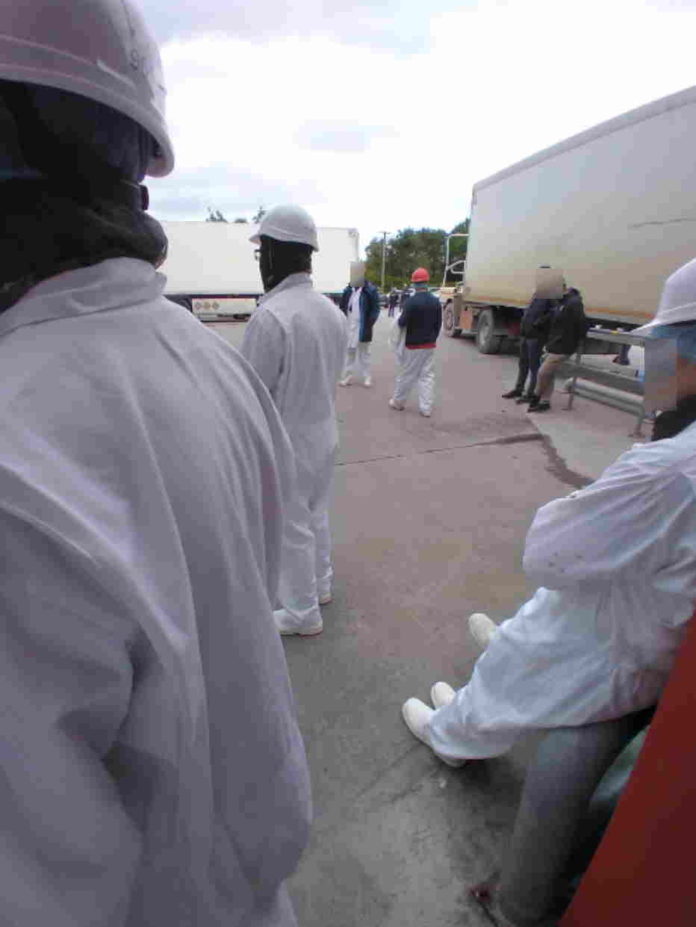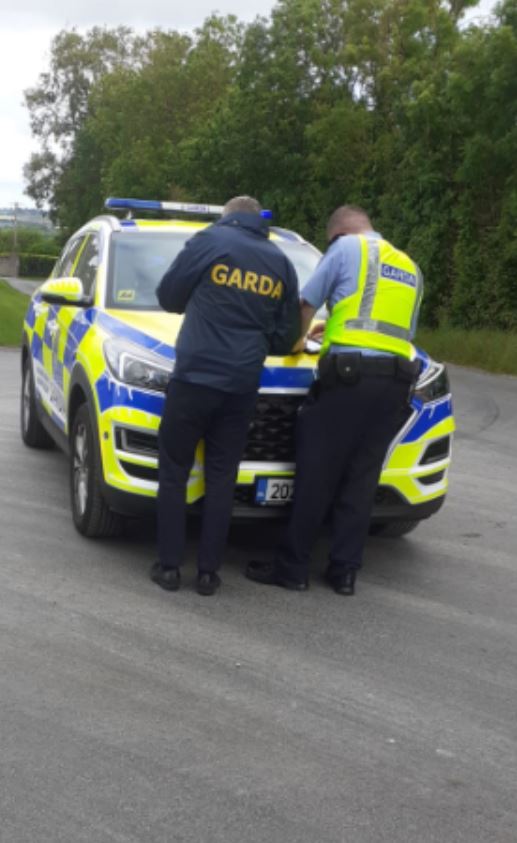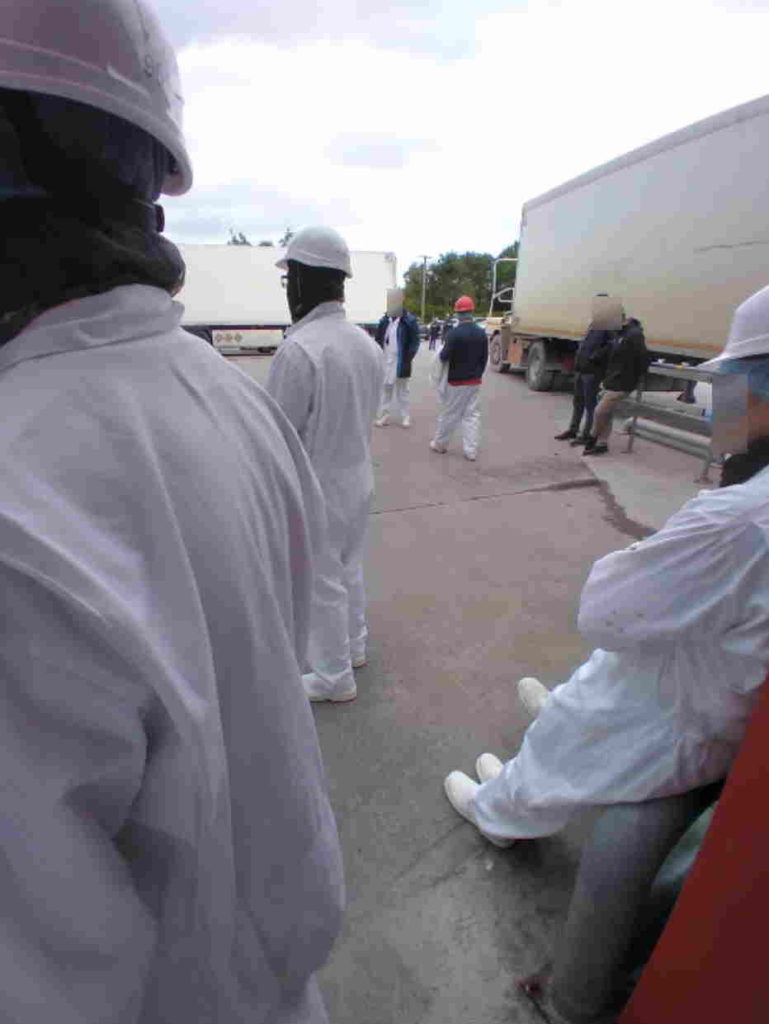Gardaí have raided a major meat factory at the centre of an Irish Mail on Sunday investigation into the exploitation of migrant workers.
The operation this week – involving more than 40 officers from multiple agencies – identified substantial numbers of illegal workers as Garda
officers swooped and seized documents, computers and phones on site.
Several cars belonging to the workers were also impounded during the day-long operation on Wednesday.
Follow-up searches at other locations, including a nearby private residence, throughout Thursday and Friday also yielded fraudulent European identity documents and electronic devices.
The identities of more than 50 of the plant’s 150 workers whose immigration papers did not appear to be in order during the raid are now being checked and verified by Garda detectives.
The MoS has learned that, as a result of the raid, at least half a dozen workers who were detained proceeded to claim asylum in a bid to prevent their deportation. It is understood one worker has gone ‘underground’ and is now missing.
In a statement yesterday a Garda spokesman said Wednesday’s operation was focused on the ’employment of illegal immigrants and forms part of a wider investigation into human trafficking targeting those involved in facilitating illegal immigration into Ireland’.
Led by Detective Superintendent Michael Buckley of the Garda National Immigration Bureau, the operation involved more than 40 personnel, including interpreters, document examiners and officials from the Department of Social Protection and the Workplace Relations Commission.
Gardaí from the National Drugs Organised Crime Bureau, the National Protective Services Bureau, the National Economic Crime Bureau and the National Cyber Crime Bureau were all involved in the operation.
The raid follows an in-depth investigation by this newspaper into alleged illegal work practices.
Our investigation – published in April 2021 – exposed serious claims of irregularities at the same factory, including the alleged supply of fake papers to illegal workers by foreign criminal gangs.
The claims, outlined in a protected disclosure by an employee turned-whistleblower, were supported by HR records and testimonies from former workers.
In the wake of these claims, An Garda Síochána launched a criminal investigation into suspicions that workers were being illegally supplied to meat plant owners.
Under the Employment Permits Act 2003, employing someone without a valid permit carries a penalty of €250,000 and/or a prison sentence of up to 10 years.
Workers who do not possess a permit face fines of €3,000 and deportation if they are here illegally. This week’s raid was carried out on foot of a seven-day search warrant issued by a District Court judge.
This entitled officers to search the plant and seize company files, computers and phones.
Such evidence is vital in establishing what factory owners, company directors and managers may have known about any illegal employment practices.
Under the Employment Permits Act, directors and managers can be prosecuted if an offence committed by their company was taking place with their ‘consent or connivance’.
The whistleblower whose disclosures to the MoS led to this week’s operation, claimed they had raised concerns with managers and owners at the plant.
But when the workers supplied suspicious papers, the whistleblower claimed factory managers told them: ‘We’re not here to check if they are fake or not… we are not immigration.’
The factory owner denied any wrongdoing when asked about illegal workers for our original investigation last year.
The owner, whose companies post large profits annually, conceded it was possible some workers may be ‘using the wrong ID’ but insisted he made all work permit applications in ‘good faith’.
‘Possibly there’s things go on that we wouldn’t be aware of,’ he said at the time. ‘If people are on false papers – if we find any information whatsoever – they’re dismissed of immediately.
‘We don’t know the people personally, we’re entitled to apply for permits as per the State regulations and if someone applies under a different name or something – if they come in through immigration, they’re all checked, they’re all licensed with the guards, everything is done correctly.’
Our investigation revealed how the recruitment system at some meat factories is controlled by ‘capo’-type figures who typically run the kill lines and the boning halls. These tight-knit teams
consist overwhelmingly of male workers, often from the same communities in Brazil, who speak little English and help each other to beat employment and immigration laws.
However, rather than helping migrant workers who are badly needed in sectors such as the meat industry, these practices force immigrants to pay capos for fake documents.
Because of their illegal status, such employees are then at risk of exploitation.
For example, they must maintain favour with their capos, powerful individuals who control their workplace and often make unreasonable demands.
Furthermore, they do not enjoy any of the protections afforded to legitimate workers.
In interviews with the MoS, several of these workers spoke candidly about their experiences of working illegally at the plant.
One worker claimed he had worked illegally for years until he was badly injured and let go.
Today, this individual is now illegally employed at a different meat plant – a feat he can achieve with little difficulty given the culture of the sector.
‘Many people in these places are illegal,’ another former worker at the plant told the MoS.
The fake documents used to gain employment are typically procured from criminal networks with links to Portugal and Italy.
National identity cards from these locations are considered easier to forge than passports and can be obtained directly by individual workers or through several online providers. These ID papers are ordered to match the names of existing Irish PPS numbers that have been bought or passed down from migrants no longer living in Ireland.
In one case, a nephew in his 20s appropriated the PPS number of a much older uncle who had returned to Brazil. He was then able to combine this with fake ID papers to work as a purported EU citizen.
In other cases, employees who previously worked illegally under assumed identities have successfully obtained work permits in their real names.
This allowed them to leave Ireland and re-enter the country legally on their work permit, with their service to the factory barely interrupted.
Tackling these illegal practices to protect workers in meat plants has been something migrant rights groups and trade unions have demanded for years.
Siptu manufacturing division organiser Greg Ennis said many workers in the wider meat industry are afraid to speak out about what he described as this ‘modern form of slavery’.
Mr Ennis said ‘exploitation of this kind in the meat industry is, unfortunately, all too frequent’ among a vital cohort of vulnerable workers.
He told the MoS: ‘During the pandemic we saw the wider consequences of this with widespread Covid outbreaks in meat plants and the resulting lockdown of three midland counties. The Government has repeatedly failed to protect workers’ rights in this sector.’
Mr Ennis also called for the living wage of €12.90 to become the new minimum wage since those, such as meat plant workers, on the present minimum wage of €10.50 are ‘struggling to survive due to current inflationary pressures’.



